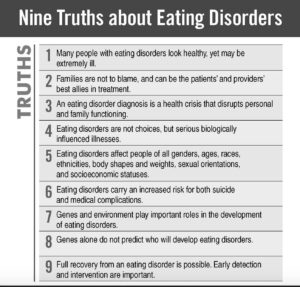by The Cowl Editor on October 16, 2020
Opinion

by Emily Ball ’22
Opinion Staff
Trigger Warning: This article contains a discussion about eating disorders.
In a culture that is hyper-aware of physical appearance and body image, the diagnosis of eating disorders has become a more prevalent issue. According to the National Eating Disorders Association (NEDA), “An estimated 30 million Americans suffer from an eating disorder at some point in their lives.”
Those that fail to understand the magnitude of eating disorders must work to be more sensitive to harmful rhetoric and inaccurate popularized beliefs that can be triggering to those suffering from eating disorders.
Our society tends to falsely characterize anorexia as a dietary choice, while, in reality, this type of language undermines the true struggles that somebody suffering from anorexia endures on a daily basis. In fact, anorexia is the complete opposite of willpower and control, and romanticizing it is harmful to somebody whose life is upended by this illness.
“Our culture sees and promotes anorexia as a self-control ideal. In reality, anorexia is a deadly mental illness and is anything but control,” said Erin Gargaro, a member of the NEDA community.
By using language that falsely idealizes anorexia, we are indirectly discouraging those suffering with eating disorders from seeking the help that they need. Those suffering may begin to think that their illness is not actually an illness when society idealizes it.
An instance of this harmful rhetoric occurred in 2018 when Amazon plastered language undermining the issue of eating disorders on the front of a sweatshirt.
“The ‘Anorexia Styling Hoody for Women’ sold by ArturoBuch on Amazon reads ‘Anorexia (an-uh-rek-see-uh) Like Bulimia, except with self control,’” the NEDA said.
Although Amazon has since made this sweatshirt unavailable for purchase, this type of triggering language is still prevalent in society today and is very damaging to the mind of someone suffering from anorexia.
An additional common yet factually incorrect belief is that all people who suffer from eating disorders are “skinny.” This belief is harmful to someone who is considered an average weight or a weight that is somewhat above the average for their age group, as this language discounts their pain and suffering from an eating disorder.
“I knew I had become a little obsessed with food and how I felt about my body, but I felt an eating disorder was something ‘skinny’ people got, and I wasn’t ‘skinny.’ However, the doctor explained to me that people of all weights and sizes can develop eating disorders and that he felt my behaviors indicated I had bulimia,” Marie Duffy, a mental health advocate, said.
The misconception that somebody suffering from an eating disorder must be “skinny” is harmful to people who do not fit into that stereotype. Those undergoing this experience will feel as though their struggles are unjustified because they do not look like somebody society would perceive to be suffering from an eating disorder.
The focus on body image is omnipresent in modern society. As such, it is important to be sensitive when talking about eating disorders. The language that you use can be harmful, even if that is not your intention, as you never know the full extent to which somebody is suffering.